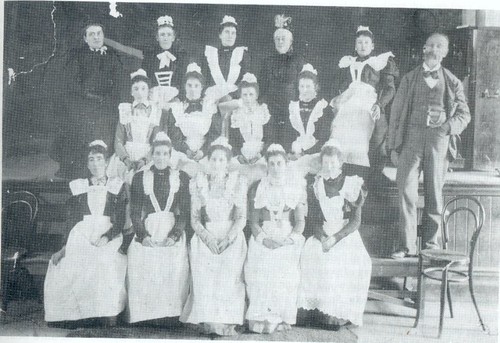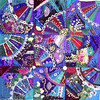Apronology II
I've just had a few interesting days doing the rounds of my Op Shops to see what aprons are around - not much, but some fascinating conversations.
The most interesting ones are what some ladies identify as "Fete aprons", usually made of three rectangles joined along the long side - two colours on the sides and a different one in the centre, that they reckon are leftovers from women making dresses. They would then make up an apron, and put it out at a fete, rather than wear aprons made of the same fabric as their dresses.
Then one of the women really prompted my thoughts, by saying her mother had talked about "Bazaar Aprons", where women got together to have bazaars, and each woman or group of women would have a stall, and there was much competition about who had the better apron. And sometimes even competitions for best stall at the Bazaar, which included how women were dressed.
So that reminded me of this photo:
This is the Stratford Mechanics' Institute Bazaar of 1899 (yes, Stratford, Victoria, Australia, on the river Avon). It includes two matrons (one at least known for her fancywork skills) and a male "secretary". The rest are younger women (married and single), and their aprons are rather spectacular.
Yet, I suspect several things. Firstly, women of their station and that era would not have been wearing aprons when entertaining (they often dressed in their best to walk across the paddocks on Sunday, to sit in parlours with neighbours similarly dressed). When they did work (and work they did), their aprons would have been much plainer - they would not have risked their fancy-work in a harsh work environment.
Later hostess aprons (ie the 1950s ones), seem to be glamorous half-aprons - where there is a bib is was usually more ornamental than functional. Imagine, for example, a ruffled heart as a bib.
So I suspect my informant was right - there was an actual genre of fancy "Bazaar Aprons" - and this one of my m-i-l's, although I think it is from the 1970s or 1980s, possibly had its origins long ago in that style. It would be nice to think so, but we will never know.
And it would be nice to know where Gina's embroidered aprons (I think of the 1930s) fitted in as well. (Wish I could link - bother blogspot being down for me!).
PS1 - I can now better appreciate the tradition in the first piece of sewing we girls had to do at secondary college in the 1960s. It was to make a bib-and-brace apron in a revolting mushroom-coloured cotton. That we then wore for cookery.
PS2 - If anyone would like a better copy of the apron photo above (it is copied from a published book), I do know where the original is held, and I will seek to borrow it and copy in a month or so - that museum is packed up for redevelopment, and all the photos are in a cabinet in a corner with the rest of the museum packed in front of them. Anyone know of any other photos like this???








1 Comments:
Chloe, I have been wondering why anyone would do such beautiful work just to get it dirty, so I'm sure you are right. My aprons look as if they have been used to clean the garden, and that's after washing!
My first school needlework project was also a bib apron. White, with two pleats to the skirt and trimmed with red and green stripes (the school colours). The second project was a pair of white shorts for tennis - horrendous!
Post a Comment
<< Home